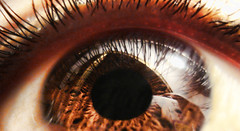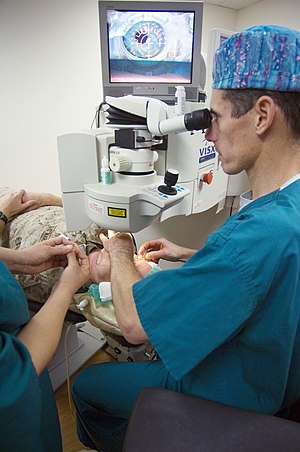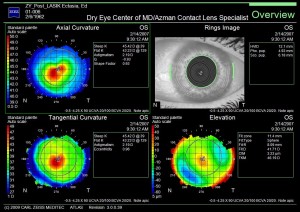Keratoconus Contact Lenses Specialty:
Global Complex Eye Care is the preeminent contact lens specialty practice in the greater Baltimore area. Patients are referred to Global Complex Eye Care from eye care professionals throughout the United States.
Our practice is specifically designed, equipped, and staffed to provide the Scleral contacts lens patients with nothing but the finest in professional care. As contact lens specialists, we have successfully treated thousands of patients, including many who were previously told they could not wear contact lenses. Optometrists and Ophthalmologists from all over Maryland and surrounding states refer their challenging contact lens patients to Dr. Irwin Azman.
When it comes to personalized contact lens care, no doctor can match the attention given by Dr. Irwin Azman and Dr. Thomas Azman. The Azman team is world renowned for their expertise, unwavering commitment to superb patient care, passion, and education in

Dr. Irwin Azman O.D.
providing personalized eye care for contact lens patients. They have earned a reputation by their peers as being the “Doctor’s doctor”.
Times Have Changed – Technological Advances at Global Complex Eye Care
Contact lenses are not what they used to be… even two years ago. Technological advances have greatly improved contact lenses and lens care products – revolutionizing vision correction.
Scleral Contact Lens
Scleral contacts are large-diameter gas permeable contact lenses specially designed to vault over the entire corneal surface and rest on the “white” of the eye (sclera). In doing so, scleral lenses functionally replace the irregular cornea with a perfectly smooth optical surface to correct vision problems caused by Keratoconus, Lasik failures, post-surgical complications, and other corneal irregularities.
Because scleral lenses are designed to vault the corneal surface and rest on the less sensitive surface of the sclera, these lenses often are more comfortable for a person with corneal irregularities. A special liquid fills the space between the back surface of the lens and the front surface of the cornea. This liquid acts as a buffer and protects the compromised corneal tissue. Scleral lenses are designed to fit with little or no lens movement during blinks, making them more stable on the eye, compared with traditional corneal gas permeable lenses. These lenses are almost always very comfortable and the vision provided by them is extremely good. The great majority of patients are able to wear their scleral lenses almost all of their waking hours without problems.
Dr. Irwin Azman prescribes scleral contact lenses for a variety of hard-to-fit eyes, including patients with Stevens-Johnson Syndrome, Radial Keratotomy and Lasik Complications and failures, Keratoconus, Corneal Ectasia, Post-Surgical Vision Loss, and Pellucid Marginal Degeneration.
Dr. Irwin Azman neither avoids nor declines the challenge of prescribing the most difficult cases. Dr. Azman tends to have a perfectionist demeanor.
At Global Complex Eye Care, our doctors keep well informed of emerging technologies by being involved in research studies and FDA clinical trials. We design and develop new contact lenses on an ongoing basis. Our doctors will recommend the contact lenses that will work best for your eyes and your lifestyle.
Our doctors prescribe contact lenses made by all major manufacturers, as well as contact lenses from smaller custom labs, and even develop our own unique contact lenses for patients whom other doctors may consider difficult or impossible to fit. Due to our doctor’s vast experience in contact lenses, they often find that patients who have not had past success with contact lenses are now able to enjoy safe, healthy contact lens wear.
As experts in the field of contact lenses, our doctors stay involved in research and development of the newest products associated with contact lenses, lectures at vision conferences, and has published numerous articles in professional contact lens literature and journals. You can be assured that our doctors will provide the highest quality of contact lens care, whether your needs are as straight forward as soft-disposable contact lenses, or as complex as fitting lenses for Keratoconus or following corneal trauma.
“One characteristic that sets Azman Contact Lens Specialists apart from other eye care practitioners is that they neither avoid nor decline the challenge of prescribing the most difficult cases. They tend to have a perfectionist demeanor.”
Physicians, Optometrists, and Ophthalmologists from all over the nation refer their challenging and complex contact lens patients to the Azman team. The doctor’s meticulous contact lens evaluation is unique and will not only determine if a patient’s eye are appropriate for contacts; but also will let the Azman team prescribe the correct type of lens that is the most compatible for the patient’s eyes and visual needs. The Azman doctors prescribe all types of contact lenses including; bifocals, progressive, lenses for astigmatism, dry eyes, golf and other sports, color vision correction, theatric, post-lasik, and many other specialty lenses. Only a comprehensive contact lens evaluation will assure long term eye health, perfect all day eye sight, and all day comfort.
The Azman team of specialists have redefined and set the gold standard of care in the contact lens profession and are known as the experts by their peers. When it comes to contact lenses they are the “Doctor’s doctor”.




